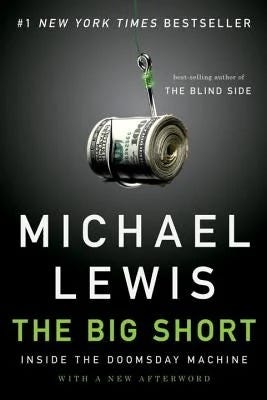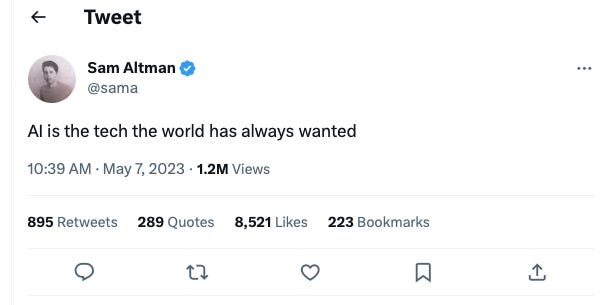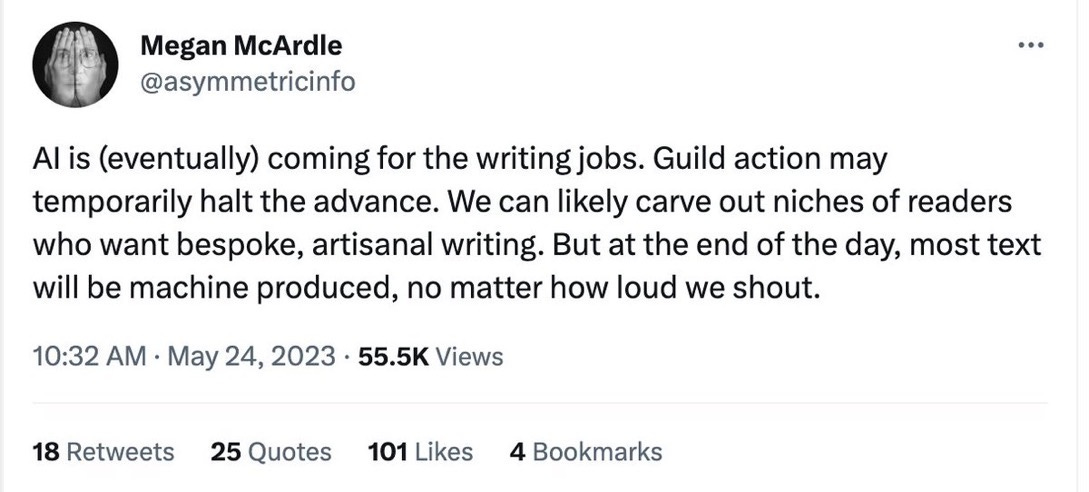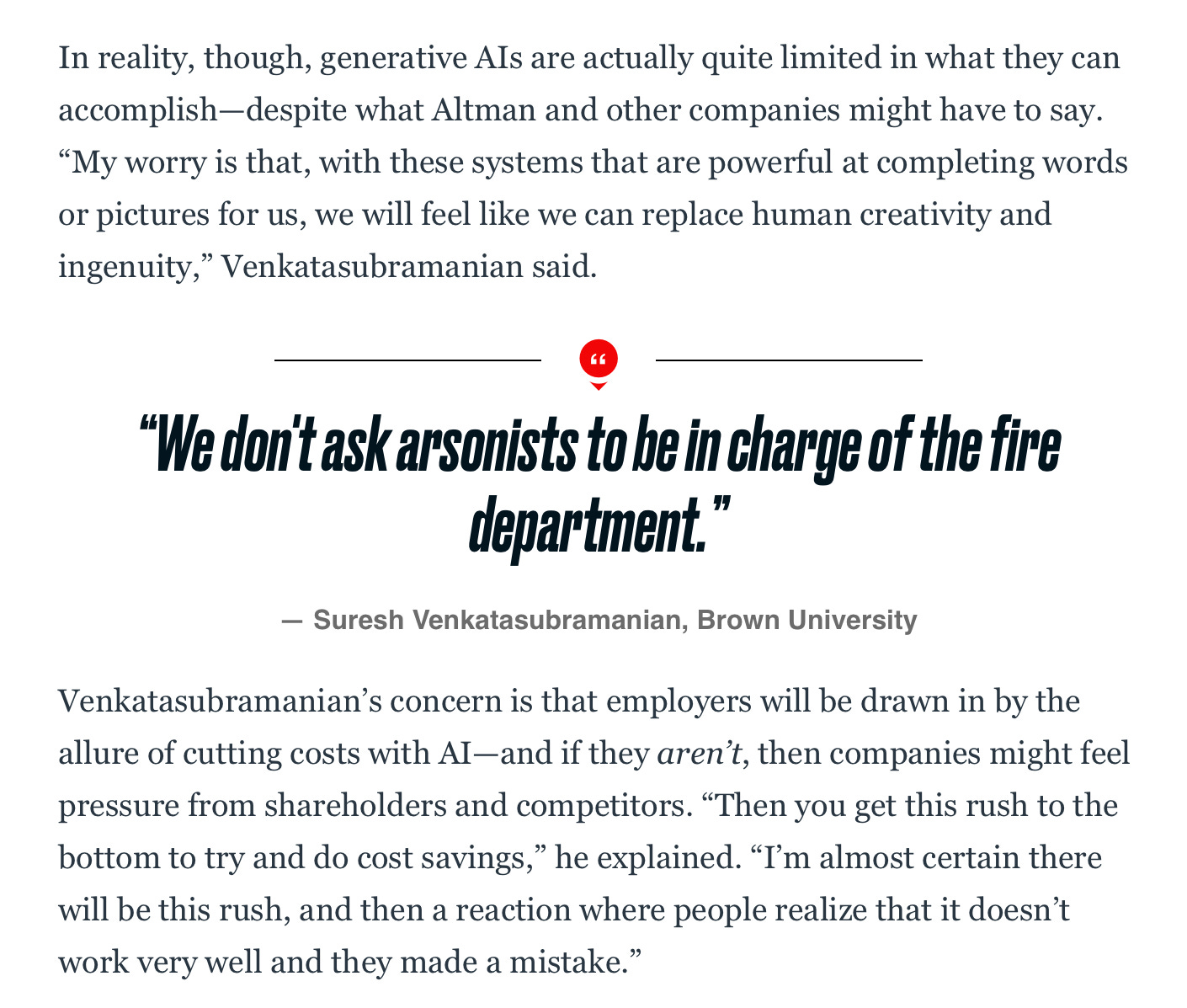AI's Big Hype
The people who stand to benefit from generative AI want you to believe their products are inevitable.
I'm a big believer in trying to understand the structural forces that lead - in some cases inevitably - to very bad things.
To pick a topic not quite at random, consider the 2008 mortgage crisis where cheap and easy money for home mortgages sold as a route to achieving the American Dream that were then turned into toxic derivatives and sold as investments blew up the world’s economy. These asset-backed securities were destined to go kablooey, and go kablooey they did, taking down a lot of institutional and individual casualties in the process.
(See Michael Lewis’s The Big Short: Inside the Doomsday Machine for the full sordid tale.)
Part of Lewis’s formula in all of his books is finding the human story underneath the large, structural events, and the ways that human frailties played a crucial role in the eventual disaster.
This intersection of bad structural incentives and hopeful, grasping humans is at the center of a lot of catastrophic failures.
My great uncle the writer Alan Seager, who I’ve written about here in the past, used a Bible verse (Job 5:7) as kind of talisman for his own work, “Yet man is born unto trouble as surely as the sparks fly upward.” He called his fiction “destructive criticism,” attempts to judge and condemn humanity, to wake people up from the slumber of meaningless, impoverished psychic existences.
Robert Olen Butler, my graduate school professor says that fiction is the “art from of human yearning,” and that the heart of all narrative is what a character yearns for.
I hadn’t really put this together before, not consciously anyway, but I think my own world view is perhaps an amalgam of these things. On the one hand, I think humanity is a pestilence, put on this earth with the impulse to destroy each other, along with the planet itself. (“The sparks fly upward.”)
At the same time, I think most of us have a genuine yearning to experience lives of meaning, of connection, of beauty. Bob Butler is right, we yearn. Unfortunately, we are often mistaken about the route to achieving what we yearn for. Maybe you want stability, and owning one’s home seems to be the route to achieving that, until suddenly it’s the opposite.
At least some of those people who signed on to those time-bomb mortgages must have at least sensed they were doomed. Why didn’t they walk away before they destroyed their own lives and those of many others? Sure, the fault for the mortgage meltdown lies with the financiers and banks, sophisticated actors whose unchecked greed plunged the country into recession, but it’s also true that individuals could have resisted taking out these mortgages that were obviously too good to be true.
Or could they? Maybe this was simply impossible given the functioning of society and the nature of human desire. Who is going to give up the chance to realize their dream?
Believing in stuff is for suckers, but sometimes you just can’t help yourself.
I’m in this mood because sharing in last week’s newsletter that I was working on a book proposal did the trick of lighting a fire under me which led me to finishing a draft of the book’s outline for the proposal. It’s not an outline so much as a series of short summaries of each chapter that gives a sense of both structure and content in the hopes that if a publisher sees it they are convinced that there’s an interesting book in the material and that I’m the person to write it.
On the one hand, exciting! On the other, let’s not get our hopes up. Just because a proposed book looks like it might be interesting and the person proposing it seems like they could pull it off does not mean a publisher wants it.
On the other other hand, writing the quasi-outline convinced me that, fortunately/unfortunately, I believe every word of what I have to say in the outline and would like to explore in full in the book, that reading and writing are among the most profound expressions of our deepest humanity, and allowing ChatGPT to substitute for these essential parts of our humanity would be a devastating mistake.
In this case, I’m the sucker, because let’s face it, no matter what I or anyone else has to say about the dangers of an unthinking embrace of ChatGPT and other large language models, these things are probably going to have their way with us, and there’s not much individuals will be able to do about it.
Sure individuals like me could make personal pledges to not use the tech to substitute for human labor or to never read or buy a GPT-created product, but let’s be serious about the effect this would have overall.
Zero.
As with the subprime mortgage crisis, the people who are developing and control this technology are motivated by some combination of hubris and greed, believing that they are masters of the universe. OpenAI CEO Sam Altman’s testimony to Congress was a classic bait and switch, first expressing his deepest worries about the potential of artificial intelligence to cause significant disruption before making sure that whatever regulation is coming needs to be in the hands of people who think like Sam Altman.
The performance was part of the ongoing hype that Altman and others have been ginning up around their products to give them a sense of inevitability. This technology is apparently so powerful that even its creators don’t fully understand how they work. Somehow this also means we should be rushing this stuff into the marketplace as quickly as possible.
In a tweet, Altman declared:
I mean, not me motherfucker! Not a lot of people, I don’t think, but somehow this nonsense just passes by as though it goes without saying Altman is correct.
Altman claims that he welcomes regulation, but when the European Union expressed concerns about the fact that ChatGPT was created by sucking up trillions of words of copyrighted material, his first response to the idea that OpenAI would have to clear this use with the copyright holders was to suggest that OpenAI would be forced to pull its product from the member countries, a threat to withhold the magic dust of a future economic boom.
Altman wants us to believe that GPT is inevitable, and it just may be, whether it lives up to its hype or not.
This sentiment from Washington Post columnist Megan McArdle is dismayingly common, even among writers.
I don’t think she’s necessarily correct. My worry is not that this technology will obviate human writing by somehow being better. This stuff cannot think and it cannot feel. It will not do better than humans, but it may do a good enough job at lots of writing humans do to incentivize the people with the power and money to make these decisions to replace the humans with the algorithms because they will be cheaper.
And at the speed with which this is moving, once we collectively recognize that perhaps the limits of the AI make it less than the hype suggests, we will have destroyed the existing structures that allow writing by humans to happen. We were heading down that path before ChatGPT came along anyway.
Commenting to the Daily Beast in the aftermath of Altman’s congressional testimony, Suresh Venkatasubramian of Brown University tried to puncture the hype by pointing out the inherent limits of generative AI and large language models.
As a case in point, perhaps you heard about the lawyer who turned to GPT to provide him citations for a brief, citations that were entirely invented - hallucinations in the parlance of the technology - and for which a judge read the attorney the riot act.
A significant part of The Big Short is the story of the people who knew the meltdown was coming, but whose warnings weren’t heeded. Some of those people got fabulously wealthy by shorting the subprime mortgage market. Those same people feel a sense of guilt over their fortunes and that they could not prevent the meltdown and the catastrophic harm that came to so many.
I don’t pretend that this newsletter or the book, should it come into existence, will have any impact on what happens. It won’t, and not just because at best a few thousand people will read this newsletter or the book, but because we, those of us who believe in the preservation of human values, even if we are legion, even if we are a majority, probably do not have the power to stop what’s going to happen, the same way there were never going to be enough individuals who refused cheap mortgages to prevent a global recession back in 2008.
But should I have the opportunity, I’m going to write the book because what else am I going to do? If it’s published, at least there will be a record that some people somewhere were sounding a warning. I don’t know more than anyone else about the technology, but I do know about the importance of reading and writing as a human exchange and I’m going to shout that message as loud as possible. Unlike my great uncle, I hope that it is constructive criticism, even though at this stage, it’s more like to be a pre-mortem for a great loss to come.
And if I’m wrong, and generative AI is the gateway to mass human flourishing and creativity, rather than a potential disaster that’s going to scorch the earth, leaving behind a landscape hostile to human expression where people only have access to bot-generated texts and no one can get paid to write, who cares? No one reads books anyway!
Win-win!
Links
At my Chicago Tribune column I share my enthusiasm for the Studs Terkel archive, which has some amazing conversations between the interviewing master and true legends of literature. Check out the archive for yourself.
The folks who review books for NPR have shared the 19 books for the summer that they’re most excited about.
LitHub has 25 nonfiction books that it thinks you should be thinking about reading this summer. If you take that NPR and LitHub books together, that’s a whole lot of reading.
Cosmopolitan has a list of “17 queer books” they think you should be on the lookout for this year.
Roxane Gay Books, author Roxane Gay’s imprint at Grove Atlantic, is looking for someone to assume a paid fellowship that comes with $25,000 plus benefits for half-time work.
This data visualization drawn from the Open Syllabus Project on what books from the 1980s, 90s and 2000s are most often assigned in college courses is kind of interesting.
Recommendations
All books linked here go to The Biblioracle Recommends bookstore at Bookshop.org. Affiliate proceeds, plus a personal matching donation of my own, go to Chicago’s Open Books and the Teacher Salary Project which is advocating to establish a federal minimum salary for teachers of $60,000 per year. Affiliate income is $117 for the year.
1. The Mortifications by Derek Palacio
2. The Midnight Library by Matt Haig
3. The Candy House by Jennifer Egan
4. Truly, Madly: Vivien Leigh, Laurence Olivier, and the Romance of the Century by Stephen Galloway
5. The Story of the Trapp Family Singers by Maria Trapp
Karen R. - Beverly Hills, CA
Eagle-eyed readers may recognize this as the list from last week when I recommended Jess Walter’s Beautiful Ruins. As it happens, Karen has already read, and “loved” Beautiful Ruins, which is a testament to my book recommending prowess, but also a bummer because she deserves to be introduced to a new book. I’m taking a second swing with Tom Rachman’s The Italian Teacher.
Is Sam Altman correct? Is AI the tech the world has always wanted? What say you? Are you rushing into the embrace of artificial intelligence, or are you like me and want to just be left alone as your flawed, meat sack self? Let us know in the comments.
Had a much higher uptake in new subscribers than usual this week, which likely means someone with much more juice than myself said something nice about the newsletter, so whomever that was, thank you, and if you enjoyed this installment, please consider subscribing.
I hope all of you USians have a nice remainder of your long holiday weekend.
John
The Biblioracle








While I beg to differ with Sam Altman, a greater mind than mine, AI is not what I have been waiting for. But it, like many other tech forward tools, i.e. the internet itself, is only a tool. I am trying to write a memoir of my family, for my family, not for publication. Rather than make it a chronological list of events, names, and dates, I am trying to make it readable, humorous, and poignant. With no prior experience writing creative non-fiction, I have difficulties. I write and write and write. With the magic of editing tools, Grammarly, ProWriting Aid, and the editor in Word, I sound better all the time. Also, I learn from the suggestions. I was stuck the other day and wanted a word starting with p for an alliterative string of descriptions I was trying out. My thesaurus skills weren't cutting it. Hmm, I'll try ChatGPT. Four seconds later, boom! Another tool at my disposal.
Yes, straight up AI is a disruptive technology. Still, nothing will replace human creativity. When I sent a paragraph out there for suggestions, what came back wasn't me, so I returned to my merry way in my own voice.
I just saw Altman’s session at Wisdom 2.0 with Jack Kornfield. Altman reminded me of my younger self when I was negotiating with AOL at the height of its power. I got rolled. The tech giants will say anything but the juice that drives them seems to be much more banal, like getting Samsung to use MS Bing rather than Google (it’s a multibillion dollar contract).
Altman is socially pleasing window dressing and is not in control. His company has seven directors and he does not control them. I appreciate your cold water and agree that the tech giants pursuing competitive gains will do what they want. The FTC notably stated that companies that fire their ethics teams should not be surprised by regulation. I hope this is true and that we don’t have more regulatory capture. Thank you for your tech perspective. https://jackkornfield.com/how-will-ai-impact-our-world-a-conversation-with-sam-altman-of-chatgpt/